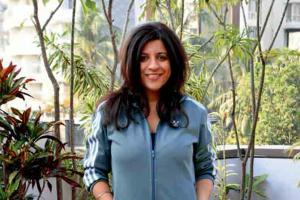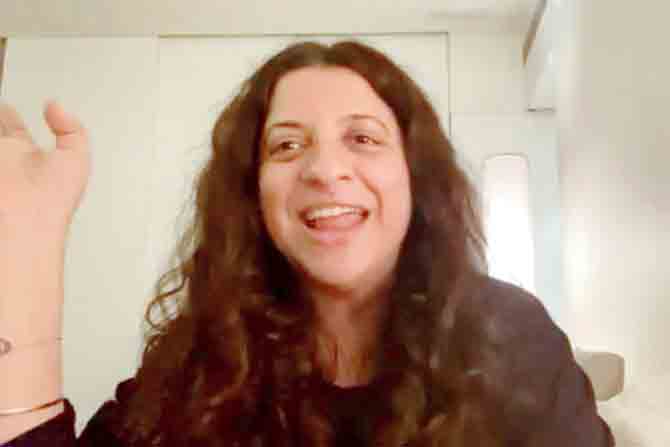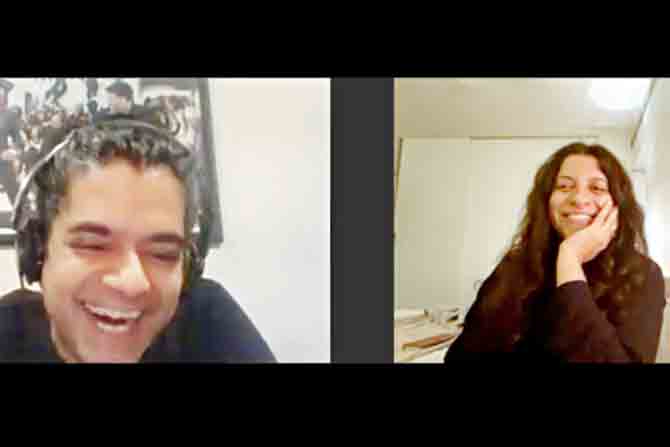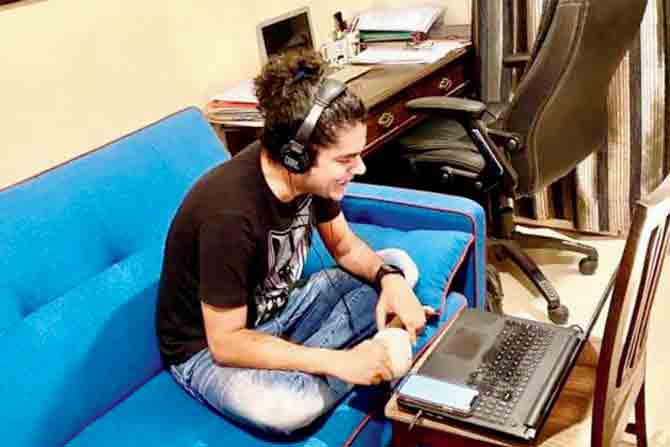Bollywood's most loved filmmaker Zoya Akhtar looks back during the lockdown.

Zoya Akhtar
Consider writer-director Reema Kagti (Gold, Honeymoon Travels Pvt Ltd) as an Australian male Ricardo Fernandes, looking for his lost brother in Mumbai, while filmmaker Zoya Akhtar is the local don Mastana's hot moll. That's really how Zoya first met Reema, during the audition for Kaizad Gustad's Bombay Boys (1998).
ADVERTISEMENT
Reema, as the casting assistant, was standing in for Rahul Bose. Zoya, opposite her, was actually testing for the film's female lead role—mainly to humour Gustad, because he was keen she read for the part, that finally went to Tara Deshpande. Zoya was clear she wanted to AD on the movie.
AD, meaning assistant director—both a proper noun and an active verb on a film set. It's been over two decades since Bombay Boys, where Reema and Zoya were second ADs. Their partnership, as writers over the past decade though, counts amongst its achievements, Gully Boy (2019), the Amazon series Made In Heaven (2019), Dil Dhadakne Do (2015), Talaash (2012), and Zindagi Na Milegi Dobara (2011).
Bollywood wise, they could well be—albeit slightly Bonzai—versions of the '70s super-hit, Salim-Javed (Zanjeer, Deewar, Don, Sholay, Mr India)—the most successful writing pair ever, comprising Salim Khan and Zoya's father, Javed Akhtar.
I say this, while Zoya is talking to us from where Salim-Javed used to work out of—the study in her Bandra family home—that she now uses as her bedroom: "I'm just absorbing them," she smiles. She also drops a hint at working on a talkathon/documentary project of sorts to do with Salim-Javed themselves, as part of her newly launched production company.
But it's too early to talk about, she insists. Much is naturally made of Zoya as poet-lyricist Javed's daughter, eighth generation writer from the Akhtar family. Her love for films, as she points out, flows first from her mother's fine collection of world to latest cinema, projected on the screen at home, growing up.
Also the fact is that it's her mom, Honey Irani, who's the Bollywood insider in the family, having literally grown up in showbiz (Javed had moved from Bhopal).
Wikipedia rather exaggeratedly lists her as the child-star of 72 films!

The filmmaker joins the virtual edition of Sit With Hitlist from her Bandra home
Honey would've done minimum 20-30 movies as the much loved kid-face of the big screen—graduating much later to screenwriting, with popular titles like Yash Chopra's Lamhe (1991), Aaina (19993), Darr (1993), Rakesh Roshan's Kaho Naa Pyaar Hai (2000), Koi… Mil Gaya (2003), Krissh 3 (2013).
Zoya reminisces, "Now, everybody has a camera to record their children. But people in my generation did not have footage of when their parents were three years old. I was one of the few kids, who had my mother from the time she was two, to when she was 16! I've seen my mother animated [on the screen], with different expressions, speech, seen her change, and grow. It's really interesting even now, to see her like that. She was darn cute, man! She, and my aunt Daisy [Irani]!"
She rues in jest, "Everybody in my family has a National Award— my mother, father, brother [Farhan Akhtar], step-mother [Shabana Azmi], cousin [Farah Khan], everybody. Except me!" Which film did her mom get a National Award as the kid-lead? "I don't know, if it was for Pyaar Ki Pyaas or Taare Zameen Par, one of the two." There was a yesteryear film called Taare Zameen Par? "Zameen Ke Tare! Both my mom, and my aunt."
The mom's acting gene, Zoya contends, went to her younger sibling, Farhan: "He is a bona-fide performer—he always had that. I hate being on stage, or before the camera. My first thing to do with the arts was to write—watching both my parents work at home, discussing scripts… That was one of the first things [in my head]. Directing came later."
Held over video-call for the first time, Zoya is also the first filmmaker to feature on our unscripted conversation series, Sit With Hitlist—so far limited to Hindi cinema's lead actors. Reason for that of course is that she's arguably Bollywood's most loved filmmaker, and therefore a star in her own right.
That apart, little is known about her life up until her rather belated directorial debut at 36-plus, with Luck By Chance (2009), although she'd been working as a film professional for around 18 years before that. Very little worth knowing, Zoya casually reckons, jogging back to age 19, when she started interning for a copy-writer's job at a creative agency—simultaneously reading sociology at Bombay's St. Xavier's College.
"I remember watching Salaam Bombay (1988), being madly in love, and going: I want to direct. And I don't know what I'm going to make. Because Hindi films were not my scene then. Out of the blue, when I was about 21, I got a job with Mira Nair on [the sets of] Kamasutra (1996)." You can find her in a cameo appearance as one of the Kamasutra girls, "an extra part," as she puts it, because ADs are frequently expected to fill-in or add to the human backdrop on shoots.
Of all her past associates, Mira as director appears to have left a strong impression on Zoya: "Mira is just special, you can see that. When she is talking to you, you are the only person in the world. She makes people feel special. She knows everybody on a crew by name. I love that about her. And I love her aesthetics."
Post Kamasutra, Zoya recalls, "I started working mainly on American projects that came to India. Went to NYU [New York University] for a diploma [in filmmaking]. Stayed back in New York. Got a job, thanks to Ismail Merchant, in a small, cool, indie film called Side Streets, directed by Tony Gerber."
She returned to Bombay as a freelance, professional AD, of which there were only four in all of Bollywood, who did a lot of foreign films and Indian work: "Reema [Kagti], [director] Apurva Lakhia, and me. Then Kiran Rao came in." Zoya's credits during this phase include Mahesh Mathai's Bhopal Express (1999) and Dev Benegal's Split Wide Open (1999). She chose to specialise in the casting department, because there, "you get to direct actors, with a script," and that's what she ever wanted to learn/master anyway.

Screenshots of Mayank Shekhar and Zoya Akhtar during the online chat
She was the casting director on Farhan's first film Dil Chahta Hai (DCH, 2001), and thereafter Armaan (2003), her mother Honey's directorial debut. Okay did she personally pick/cast that balloon-lover boyfriend in Dil Chahta Hai? "Oh that's actually Hassan, a childhood friend of Farhan. But we handpicked everyone, so to speak. There are very interesting cameos. Kiran Rao is one of the girlfriends in Goa. She'd come to do all the extras' casting for the film's Goa leg!"
Between freelance AD-ing, Zoya had been ideating all along for her debut feature. It's mildly ironic that while so cued into casting, she was unable to kick off her first film for want of a lead actor, for almost a decade that she'd been ready to direct. And the one she eventually cast for the lead role, in her directorial debut (Luck By Chance, 2009) was her brother, Farhan, who'd been around all along!
"You cannot cast someone, unless they are ready. And feel that they want to do this. It took Farhan a while to get there—that he wants to act, and that he is a really good actor." While practically the entire Bollywood A-list came down for cameos in Luck By Chance, including both Shah Rukh Khan and Aamir Khan (guessing, for the first time in the same film, although not in the same frame), Farhan was the seventh star to read/consider/hear the script. Hrithik Roshan played the second lead. "Luck By Chance is a book that I am going to write one day, about how that film got made," Zoya sighs.
Can't wait. It'd be quite a telling tinsel-town tale, given that nobody in Bombay does it. And Zoya is perfectly positioned to—not just as the quintessential insider, but as someone who can surprise you with her adorably random zaniness, on occasion. Recently at an interview she called herself the love-child of directors Karan Johar and Anurag Kashyap. What does that mean? "That I am halfway between Indie and commercial, you know."
One time I remember getting a smoke with a group, outside a closed-door meeting with director Oliver Stone who was in Bombay then, and Zoya casually mentioned, "You know, there are four kinds of people in the world—John, Paul, George and Ringo." What?
I bring that up again: "That is a line from a Tom Robbins book. Have you read Tom Robbins? I love him. I don't remember what the context of that conversation was. You can look at everyone, and be like—that's a Paul, Ringo, George. I am a John, for sure!"
And while her films primarily deal with real, human, often raw emotions, there is this carefree cattiness that inevitably slips in too. It's only fair that we dig into a couple of stories behind some stellar, surprising choices she's made so far. For example, why/how/when did a ladies' bag, called Bagwati, bag a proper part in the breezy masterpiece Zindagi Na Milegi Dobara?
"That comes from Reema and a close friend of ours, Shai Heredia, who's an academic, award-winning documentary filmmaker, and hysterically funny. She and Reema were on a road trip, and they kept talking to Shai's bag. Think they were just tripping! We just put it into Zindagi."
It was Zoya's second film, with Farhan and Hrithik back on her frame, but in a much wider canvas, although the script started out in her head as a small, cathartic, road movie, about three boys in a car—for all the road trips she's taken in her life. Over time, of course, the script "developed a life of its own".
The film she co-wrote after was Reema's Talaash. It's a supernatural thriller that, by the way, was based on a true story, that happened to her! "You have to stop. I am going to be the crazy lady that goes on interviews and says all this shit. I know it sounds really crazy, and I don't want to be propagating this nonsense. But, I had a strange experience on Haji Ali, while a bunch of us were driving back from a nightclub. We thought we had hit a naked woman in the middle of the road. Everybody was freaking out. This is something I told Reema about, and where Talaash came from. I am not going to repeat this story, ever again!"
Okay how about the dog called Pluto, who's the narrator/POV of Dil Dhadakne Do; where does he come from? "From my super-smart, intelligent beagle Zen, who passed away last year. You can find him on my Insta page, Zen Akhtar. Zen would look at us as though he is watching National Geographic—that we are the animals, and he is like, 'What are they doing?' That's Pluto. Even the way the film is shot [as a result] is observational—there are no close ups, only 'wides'."
After a preview screening for Aamir Khan and his wife, Kiran Rao, both of whom Zoya makes it a point to get a feedback from before her film's final cut, she asked Aamir if he'd like to voice the dog: "He was, like, after these many years, you have offered me the voice of a dog? I said, please do it. He was, like, yeah, totally! And he just came [on-board], like a sweetheart. It was great!"

The Entertainment editor connects over a video call
Is there anything she'd like to change about Dil Dhadakne Do? "I think the title. Would have been nicer [if it had] a little more gravitas." How about the climax (that was rather OTT, compared to the rest of the film's tone)?
"I actually liked the climax (of the mom, dad, sister jumping off the ship, with lifeboats to chase down brother/Ranveer Singh's character). The whole metaphor of the trip is that you can't get rid of anyone. Family is what you are stuck with. You can't just walk out the door. Eventually, when shit hits the fan, they are the only ones who will pull you up too. So when everyone tells me, I don't like the climax; I am like, cool, so what would you do? Till now nobody has given me a better ending. If there is one, I'd be like, damn!"
What did upset Zoya even before the release of Dil Dhadakne Do though was people taking the piss out of the picture for it being centred on lives of the super-privileged—intended also as a barb against movies that Zoya had directed thus far.
"Firstly I don't think it was criticism. There is nothing for me to take home from it. It is like somebody seeing a trailer of Gully Boy and saying, oh, this is about poor people. And I made Made in Heaven, along with Gully Boy. And that is about very rich people!"
"I was being interviewed by this woman wearing diamonds and solitaires, and she was telling me, it [the film] is about rich people. I was, like: Would it bother you, if your husband has an affair? Why? But you have solitaires on, it shouldn't bother you! What does it even mean?"
Before Gully Boy—set in a Mumbai slum and the city's underground rap scene—released, it got roundly compared to the American ghetto, hip-hop biopic, 8 Miles. Did that bother her? "The two people I spoke to [to base the film on their lives] are living here. You can talk to them. So, no, I didn't get into it. It bothered me, when they compared Zindagi to Hangover [producer Ritesh Sidhwani had to respond to Warner Bros]. Now, I think that's what they do."
Inspirations from dogs and spirits apart, what makes Zoya's filmmaking process special—given what we've managed to gauge so far—is she is capable of working backwards. Where she must know end, before she locks her script. Which isn't true for many filmmakers, who often arrive at the conclusion, as they navigate the story or characters' journeys: "I have to set a goal. That goal may change. But I when I set off, I have to know where I am taking the film. Otherwise I meander. I need a direction I am shooting at, you know!"
The other thing is her complete clarity on the point she's trying to make—so much so that she can distill each film into a single line, which is different from a log-line that describes a plot: "Of course Gully Boy is about a Muslim kid from Dharavi, who expresses himself through rap. It is a rags-to-riches, coming-of-age story. You can pin it down in any log line. But at the core of it, the film is about class. Luck By Chance is really about self-esteem. Zindagi is about living, seizing the day. Dil Dhadakne Do is a film about projection—who we actually are, and what we tend to project. It is what lenses the film, creates the base."
This sort of sharpness of thought, cutting through fluff, getting to the point, is also something Zoya shares with her father Javed, as a communicator in general—whether it be his works as lyricist, screenwriter, people's poet, or popular orator. He's possibly India's finest conversationalist—whose quick repartees and general gyan stick with you, if not go viral online.
Is there something Zoya remembers he told her that she's held as talisman? "Little things, you know. That when you are writing a script, whatever your story is, you've got to be able to lift your viewer. By the end of it, just lift your viewer! Don't resort to cheap shit to get a laugh or clap. Say it in the most base-denominator way, if you have to. But find a higher level of communication." It's tough, bohot hard.
Catch up on all the latest entertainment news and gossip here. Also, download the new mid-day Android and iOS apps.
Mid-Day is now on Telegram. Click here to join our channel (@middayinfomedialtd) and stay updated with the latest news
 Subscribe today by clicking the link and stay updated with the latest news!" Click here!
Subscribe today by clicking the link and stay updated with the latest news!" Click here!






